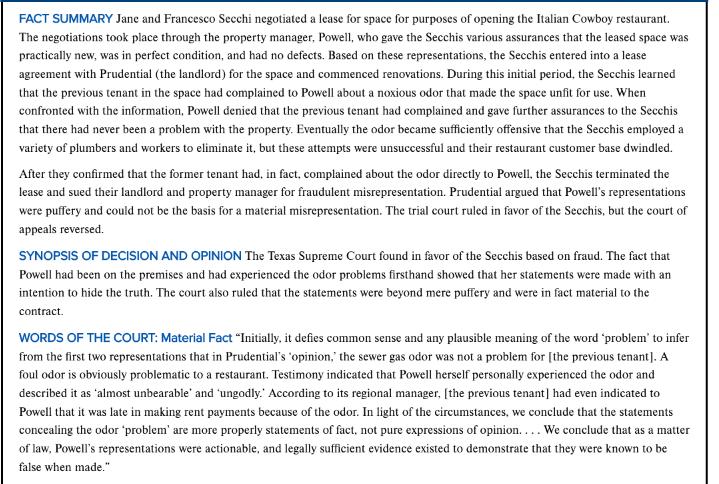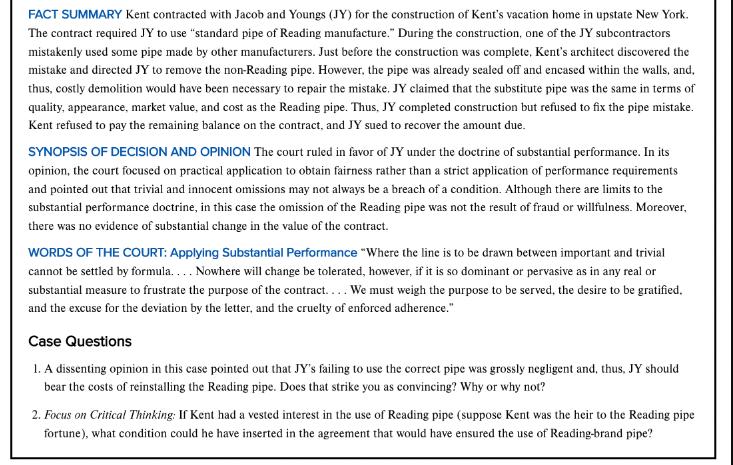Answered step by step
Verified Expert Solution
Question
1 Approved Answer
FACT SUMMARY Jane and Francesco Secchi negotiated a lease for space for purposes of opening the Italian Cowboy restaurant. The negotiations took place through





FACT SUMMARY Jane and Francesco Secchi negotiated a lease for space for purposes of opening the Italian Cowboy restaurant. The negotiations took place through the property manager, Powell, who gave the Secchis various assurances that the leased space was practically new, was in perfect condition, and had no defects. Based on these representations, the Secchis entered into a lease agreement with Prudential (the landlord) for the space and commenced renovations. During this initial period, the Secchis learned that the previous tenant in the space had complained to Powell about a noxious odor that made the space unfit for use. When confronted with the information, Powell denied that the previous tenant had complained and gave further assurances to the Secchis that there had never been a problem with the property. Eventually the odor became sufficiently offensive that the Secchis employed a variety of plumbers and workers to eliminate it, but these attempts were unsuccessful and their restaurant customer base dwindled. After they confirmed that the former tenant had, in fact, complained about the odor directly to Powell, the Secchis terminated the lease and sued their landlord and property manager for fraudulent misrepresentation. Prudential argued that Powell's representations were puffery and could not be the basis for a material misrepresentation. The trial court ruled in favor of the Secchis, but the court of appeals reversed. SYNOPSIS OF DECISION AND OPINION The Texas Supreme Court found in favor of the Secchis based on fraud. The fact that Powell had been on the premises and had experienced the odor problems firsthand showed that her statements were made with an intention to hide the truth. The court also ruled that the statements were beyond mere puffery and were in fact material to the contract. WORDS OF THE COURT: Material Fact "Initially, it defies common sense and any plausible meaning of the word 'problem' to infer from the first two representations that in Prudential's 'opinion, the sewer gas odor was not a problem for [the previous tenant]. A foul odor is obviously problematic to a restaurant. Testimony indicated that Powell herself personally experienced the odor and described it as 'almost unbearable' and 'ungodly." According to its regional manager, [the previous tenant] had even indicated to Powell that it was late in making rent payments because of the odor. In light of the circumstances, we conclude that the statements concealing the odor 'problem' are more properly statements of fact, not pure expressions of opinion.... We conclude that as a matter of law, Powell's representations were actionable, and legally sufficient evidence existed to demonstrate that they were known to be false when made." Case Questions 1. Why did the court determine that the statements made by Powell were material? 2. Should the Secchis have contacted the prior tenant to verify Powell's statements? 3. Because the court found that fraud existed, what remedies and damages are the Secchis entitled to? 4. Focus on Critical Thinking: If the Secchis had contacted the prior tenant and found out that a prior problem existed, would that have affected the outcome of this case? Why or why not? FACT SUMMARY Twin Lakes is a Texas corporation that operates a golf course located in Canton, Texas; Dekkers is an officer of the corporation. Holloway, a PGA professional, met with Dekkers and others in mid-July 2008 about becoming the head golf professional at Twin Lakes. Dekkers offered Holloway the job, and Holloway agreed to start work as soon as he could move to Texas from Illinois. At the July 2008 meeting, the parties discussed the duration of Holloway's contract, salary, and benefits. The parties then communicated via e-mail throughout the month of July and ultimately agreed to pay and benefit terms. With respect to the duration of the contract, they agreed that Holloway would work for a one-year term with the understanding that prior to the expiration of that period, they would renegotiate the contract for an additional three-year period if Holloway fulfilled Dekkers's performance expectations. Holloway started work at Twin Lakes on August 5, 2008. Within a week of that date, Holloway was given a one-page employment agreement, dated July 23, 2008, that outlined the salary, benefits, and a bonus structure. The document also listed the services Holloway was to provide. As to term, the document provided for a "[y]early contract that will be up for renewal after annual performance evaluation." It also contained a statement that the contract was agreed upon by both Dekkers and Holloway and "verified by their signatures." Holloway signed the two originals of the document. The signature line for Dekkers as owner of Twin Lakes remained blank. Holloway made a copy of the document, but he never presented it to Dekkers to sign. Approximately eight weeks later, Holloway was terminated from his employment at Twin Lakes. As a result, he filed suit against both Dekkers and Twin Lakes for breach of contract. The trial court dismissed Holloway's lawsuit on summary judgment, ruling that the employment agreement was unenforceable under the statute of frauds. Holloway appealed, arguing that the statute of frauds did not apply to this agreement because it was for less than one year. He contended the contract's language indicated that Holloway would be employed for 364 days before his performance review, and therefore that it fell outside the statute of frauds. SYNOPSIS OF DECISION AND OPINION The Court of Appeals of Texas ruled in favor of Dekkers/Twin Lakes. The court rejected Holloway's argument that the agreement was for one day less than a year. In determining whether an agreement is capable of being performed within one year, courts use two points of reference: (1) the time of making the contract and (2) the time when performance is to be completed. In this case, the court pointed out that the agreement exceeded one year no matter whether the starting point was calculated as the date on the employment document or the date Holloway actually began his employment. Because the document did not have the signature of Dekkers, the statute of frauds rendered the contract unenforceable. WORDS OF THE COURT: One-Year Calculation "Although Holloway argues on appeal that the agreement was 'clearly intended' to be for a period of 364 days or 'less than a year," he specifically testified to a one-year agreement that was made in mid-to-late July 2008 and began on August 5, 2008. If Holloway had worked for Twin Lakes for the one-year term as contemplated by the July 23 document, he would have worked through August 4, 2009, one year later. If you counted the days from the July 23 date reflected on the document Holloway signed to the date he completed his performance on August 4, 2009, the term plainly exceeded one year. Thus, to the extent Holloway alleges Dekkers and Twin Lakes breached an agreement based on the July 23 document, that agreement is within the statute of frauds. As a result, the agreement is unenforceable because it is not signed by [Dekkers/Twin Lakes]." Case Questions 1. Could the combination of e-mails and the unsigned agreement be the basis for satisfying the signature requirement of the statute of frauds? Why or why not? 2. Did the court calculate the date correctly? Couldn't Holloway's performance review/renewal have taken place well before the end of one year? If so, doesn't that mean the contract falls outside of the statute of frauds? 3. Focus on Critical Thinking: Is the court allowing Dekkers to use the statute of frauds as a shield to defend a legitimate claim by Holloway? Is that fair? If Dekkers was the one who prepared the document, isn't it reasonable to assume that he agreed to it? Shouldn't it be enforceable? Why or why not? FACT SUMMARY Kent contracted with Jacob and Youngs (JY) for the construction of Kent's vacation home in upstate New York. The contract required JY to use "standard pipe of Reading manufacture." During the construction, one of the JY subcontractors mistakenly used some pipe made by other manufacturers. Just before the construction was complete, Kent's architect discovered the mistake and directed JY to remove the non-Reading pipe. However, the pipe was already sealed off and encased within the walls, and. thus, costly demolition would have been necessary to repair the mistake. JY claimed that the substitute pipe was the same in terms of quality, appearance, market value, and cost as the Reading pipe. Thus, JY completed construction but refused to fix the pipe mistake. Kent refused to pay the remaining balance on the contract, and JY sued to recover the amount due. SYNOPSIS OF DECISION AND OPINION The court ruled in favor of JY under the doctrine of substantial performance. In its opinion, the court focused on practical application to obtain fairness rather than a strict application of performance requirements and pointed out that trivial and innocent omissions may not always be a breach of a condition. Although there are limits to the substantial performance doctrine, in this case the omission of the Reading pipe was not the result of fraud or willfulness. Moreover, there was no evidence of substantial change in the value of the contract. WORDS OF THE COURT: Applying Substantial Performance "Where the line is to be drawn between important and trivial cannot be settled by formula.... Nowhere will change be tolerated, however, if it is so dominant or pervasive as in any real or substantial measure to frustrate the purpose of the contract.... We must weigh the purpose to be served, the desire to be gratified. and the excuse for the deviation by the letter, and the cruelty of enforced adherence." Case Questions 1. A dissenting opinion in this case pointed out that JY's failing to use the correct pipe was grossly negligent and, thus, JY should bear the costs of reinstalling the Reading pipe. Does that strike you as convincing? Why or why not? 2. Focus on Critical Thinking: If Kent had a vested interest in the use of Reading pipe (suppose Kent was the heir to the Reading pipe fortune), what condition could he have inserted in the agreement that would have ensured the use of Reading-brand pipe?
Step by Step Solution
There are 3 Steps involved in it
Step: 1

Get Instant Access to Expert-Tailored Solutions
See step-by-step solutions with expert insights and AI powered tools for academic success
Step: 2

Step: 3

Ace Your Homework with AI
Get the answers you need in no time with our AI-driven, step-by-step assistance
Get Started


